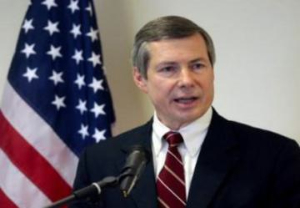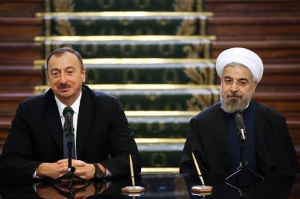Azerbaijan Struggles to Remain Unaligned in Wake of Ukraine Crisis
By Mina Muradova (07/02/2014 issue of the CACI Analyst)
The ongoing crisis in Ukraine has pushed several post-Soviet countries to decide whether they are primarily oriented toward the West or Russia. On June 27, Azerbaijan’s neighbor Georgia, along with Ukraine and Moldova, signed landmark partnership agreements with the European Union, which establish closer economic ties between these economically weak states and the EU. They obligate the countries to observe EU regulations governing customs, exports, and economic competition, and will allow them access to European markets.
At the same time, Azerbaijan’s other neighbor, Armenia, has committed to joining the Russia-dominated Eurasian Economic Union (EEU). Russia, Kazakhstan and Belarus signed an agreement on the establishment of the EEU in Astana on May 29. The summit was also attended by Armenian President Serzh Sargsyan, who nevertheless did not sign the agreement but asked for additional time.
Yet Baku has stuck to a pragmatic approach and has publicly rejected the Kremlin’s invitation to join the EEU, while being in no apparent hurry to enter any other agreement. Azerbaijan’s broader foreign policy of regional balance, favoring Euro-Atlantic integration while at the same time seeking to maintain good relations with Russia, allow Baku to reap benefits from all possible partnerships.
In June 2014, Russian ministers and high-level officials visited Azerbaijan to persuade Baku to enter closer cooperation with Moscow. Russia’s Economy Minister Alexei Ulyukayev visited Baku in early June to discuss economic cooperation and invite Azerbaijan to join the EEU. Russia’s Foreign Minister Sergei Lavrov then arrived on June 18-19 for a continuation of what he described as “a most active dialogue.” In addition, Azerbaijan hosted visits by Russia’s Deputy Prime Minister Dmitry Rogozin, Duma Speaker Sergei Naryshkin, and Development Minister Igor Slyunayev.
“Azerbaijan is our strategic partner … Our cooperation is being actively developed not only in a two-side format, but also in multi-side directions, including issues of stability and security in the Southern Caucasus and Caspian region,” Lavrov said at a news conference in Baku on June 18. The two sides discussed the situation in Ukraine, and Lavrov said that Azerbaijan has not been formally invited to join either the Customs Union or the EEU, but added that Moscow would welcome any partner interested in collaboration with those organizations.
Baku has indicated that it has no plans to join those blocs. “Azerbaijan yet has no intentions and doesn’t think about joining the Eurasian Union,” the Deputy Head (and Director of the Foreign Relations Department) of Azerbaijan’s Presidential Administration, Novruz Mammadov, told reporters on June 11.
According to Lavrov, the frozen conflict in Nagorno-Karabakh will not affect the Eurasian integration processes: “it is a subject of other international negotiations.” Kazakhstan’s President Nursultan Nazarbayev previously remarked that “the treaty with Yerevan must have a special provision about Armenia’s internationally recognized borders that do not encompass Nagorno-Karabakh.”
Commenting on Armenia’s accession to the Eurasian Union, Mammadov stressed that Azerbaijan has no reason to express any concern on this issue. Referring to an appeal from Baku to the presidents of Russia, Kazakhstan and Belorussia, that Armenia can join any organization under the same conditions as outlined in the treaty with the World Trade Organization, meaning within its internationally-recognized borders, Mammadov stressed that “this is our demand and it will be fulfilled.” Yet it is still unclear how this will be controlled.
Armenia’s ruling party insists that Karabakh will not join the EEU de jure, but Gagik Minasyan, the head of the committee on financial and budgetary affairs at the Armenian parliament, said that Armenia’s membership in the EEU will open new economic opportunities for Nagorno-Karabakh. Minasyan stressed that “Armenia and Nagorno-Karabakh are a single economic area and there can be no customs point between them.”
It appears that Azerbaijan’s refusal to join the EEU will not prevent continued arms sales from Russia. Dmitry Rogozin, who is overseeing the Russian defense industry and heading the Azerbaijan-Russia intergovernmental commission for cooperation also visited Baku in June.
According to the Atlas Analytical Research Centre, “The arms deals are beneficial for both Moscow and Baku. Moscow will get more money from arms sales and will keep Azerbaijan as a traditional market for Russian arms, while Baku will keep a strategic partnership on a high level and insure itself from serious problems with its Northern neighbor.” According to Atlas, Russian weapons sales makes up 80 percent of all Azerbaijan’s arms deals, which totaled about US$ 4 billion in the last four years and has included the transfer of many advanced systems to Azerbaijan.
In addition, Azerbaijan is willing to enhance its economic and humanitarian cooperation with Russia. Eleven commercial agreements were signed at a big Azerbaijan-Russia economic forum held in Gabala, with the participation of over 200 representatives from 25 regions of the Russian Federation. The sides discussed the expansion of transit traffic for all types of transport and agreed to ease border crossing procedures, particularly for automobile traffic.
Andrey Kazantsev, Director of the Analytical Center at the Moscow State Institute of International Relations, noted that the visits of Moscow’s emissaries to Baku constitute an attempt to maintain Russia’s sphere of influence in post-Soviet countries: “the competition for influence in post-Soviet countries has increased. While some of them have already determined who they are going to be with, there are still countries which continue to keep multi-direction policies and here either Russia or the West increases their efforts to attract them.”
According to Kazantsev, the U.S. is seeking to isolate Russia diplomatically due to its position on the Ukrainian crisis, and Russia is in turn trying to counteract these moves through the post-Soviet countries. Another key reason for Moscow’s activities is to brief Baku regarding Armenia’s accession to the EEU to avoid harming its strategic partnership with Azerbaijan, which is justified by arms sales and other economic agreements.
Dugin, Azerbaijan, and Russian Energy Strategy
By Dmitry Shlapentokh (06/18/2014 issue of the CACI Analyst)
Alexander Dugin, the well-known Russian conservative public intellectual and publicist, stated in April 2014 that if Baku would proceed with its anti-Russian policy, Moscow would not be able to guarantee the country’s territorial integrity. The implication is that Moscow would increase its support for Armenia and Azerbaijan would never be able to regain control over Nagorno–Karabakh, which remains Baku’s major foreign policy priority. While Dugin does not hold any official position, he has frequently functioned as an informal spokesman for some segments of the Russian elite and for this reason his views should be taken into account. They reflect Moscow’s displeasure with Baku due to Azerbaijan’s attempts to provide alternative gas routes to Europe.

Washington Misses the Point on Nagorno-Karabakh
By Stephen Blank (06/18/2014 issue of the CACI Analyst)
Presumably to fend off mounting criticism of U.S. policy, Ambassador James Warlick, the U.S. Representative to the Minsk Process on Nagorno-Karabakh, recently gave a series of speeches and interviews outlining U.S. policy on the Nagorno- Karabakh conflict. Warlick outlined U.S. support for the six principles that he said had already been agreed upon by all parties, and concluded that the main obstacle to resolving the conflict lay in the failure until now of the Armenian and Azerbaijani governments to make the hard decision for peace over domestic opposition. Warlick’s remarks reflect the Obama Administration’s failure to grasp what is at stake in the Caucasus or to take conflict resolution there sufficiently seriously.

Election Observers Sentenced in Azerbaijan
By Mina Muradova (06/04/2014 issue of the CACI Analyst)
On May 26, Azerbaijani authorities sentenced the Election Monitoring and Democracy Studies Center (EMDSC) Chairman, Anar Mammadli, to five-and-a-half years in prison on highly questionable charges ranging from tax evasion and illegal entrepreneurship to abuse of office. The authorities also convicted the organization’s executive director, Bashir Suleymanli, to three-and-a-half years and the head of a partner NGO called International Cooperation of Volunteers, Elnur Mammadov, who got a two-year suspended sentence. Addressing the judge, Mammadli expressed his opinion on the sentence by saying: “Just abuse Femida and let's get this over with.”
Prior to the verdict, Mammadli delivered his closing speech and said: “Azerbaijan will chair Council of Europe’s Council of Ministers for the next six months. Atletico Madrid carries an ‘Azerbaijan Land of Fire’ sign on their T-shirts. These could be good promotions for our country. However, unfortunately, our country is to be known not as a ‘land of fire’ but as a ‘Land of political prisoners’ instead.”
Mammadli was accused of engaging in illegal entrepreneurship without creating a legal entity, while he stated that he was acting as an individual taxpayer. On May 14, 2008, the court annulled the registration of Mammadli’s first organization - the Elections Monitoring Center. The founders and members of the EMC then established a new organization – EMDS. Despite two appeals to the Ministry of Justice, the government “illegally and groundlessly” refused to recognize the union, Mammadli said.
Isabel Santos, the chair of the OSCE Parliamentary Assembly’s Committee on Democracy, Human Rights and Humanitarian Questions, expressed concern on May 28 that Mammadli’s “only crime” may have been his work to defend the rights of his country’s voters. “The Azerbaijani government’s systematic targeting of civil society has reached a new low with the sentencing of Anar Mammadli,” Santos said. “His conviction and sentencing represents an affront to OSCE values in the sphere of human rights and democratic commitments.” The U.S. Embassy in Azerbaijan termed the convictions “a major setback to Azerbaijan’s democratic development.”
Oktay Gulaliyev, head of the Public Alliance “Azerbaijan without political prisoners” noted that the recent repressions against journalists and civil society activists proves that the authorities have intensified the repression against alternative voices. Apart from three election observers, there were recent arrests of journalist and bloggers, youth activists and human rights defenders. In early May, the Baku Court of Grave Crimes sentenced eight young Azerbaijani activists, most of whom were members of the NIDA civic movement promoting democracy, human rights, and rule of law, to between six and eight years of imprisonment. In 2013, they were involved in a series of peaceful protests against the deaths of young soldiers in non-combat situations.
According to the Committee to Protect Journalists, there are 10 cases of journalists in detention or prison on “politically motivated” charges in Azerbaijan. In addition, five bloggers are currently behind bars.
“The number of political prisoners in Azerbaijan is so great that they have been sorted into groups: prisoners of ‘hijab’, prisoners of ‘Eurovision’, etc.” - Gulaliyev said during a June 4 conference on the problem of political prisoners in Azerbaijan. The number of prisoners with politically-motivated charges is assessed to between 150 and 170.
“Unfortunately, Mr. Mammadli's detention adds to the concerning human rights backdrop for the OSCE Parliamentary Assembly’s annual session in Baku next month. I hope that our presence there will encourage the judicial system to take a hard look at its record on OSCE commitments and signal that these violations will not go unnoticed,” Santos said.
The 23rd Annual Session of the OSCE PA will take place in Azerbaijan’s capital from June 28 to July 2, 2014. Mammadli was a key speaker at briefings for the OSCE PA’s observation delegation in October 2013, on the eve of Azerbaijan's presidential election. The Centre’s statement on that election noted extensive violations of fundamental freedoms and a range of other shortcomings in the electoral process, many of which were also observed and reported by the OSCE.
Mubariz Gurbanli, a senior figure in the ruling Yeni Azerbaijan party, could not see any connection between Mammadli’s activities and his arrest soon afterwards. “This case should not be politicized. Elections in Azerbaijan were transparent, free and democratic … This court case was pursued because the [EMDS] organization broke the law,” he told RFE/RL.
Azerbaijan’s President Ilham Aliyev, commenting on the issue during a visit to NATO headquarters in Brussels last January, reiterated his position that no political prisoners exist in his country. He said that a resolution on the existence of political prisoners in Azerbaijan was voted down by a majority of the Council of Europe's Parliamentary Assembly last year and noted that neither the Council of Europe nor the European Parliament has yet agreed on the definition of a political prisoner.
Is an Irano-Azerbaijani Rapprochement Taking Place?
By Stephen Blank (05/21/2014 issue of the CACI Analyst)
Iran is substantially modifying its policies in the Caucasus and is seeking to draw Azerbaijan closer. The high point of this rapprochement was the visit of Azerbaijan’s President Ilham Aliyev to Iran in April, a visit arranged after he and Iranian President Hassan Rouhani met in Davos in January. The visit received glowing reporting in both countries and led to the signing of several memoranda on minor issues. However, the key is that Iranian Supreme Leader Seyid Ali Khamenei expressed assurances of greater bilateral cooperation as a result of the visit as well as Iran’s support for Azerbaijan’s territorial integrity, including apparently Nagorno-Karabakh.






